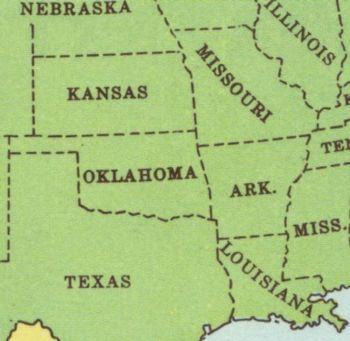Kansas (U.S. state): Difference between revisions
imported>Howard C. Berkowitz No edit summary |
imported>Paul Wormer mNo edit summary |
||
| Line 9: | Line 9: | ||
Kansas' capital is [[Topeka]]. The largest city is [[Kansas City, Kansas]], which is a twin city with [[Kansas City, Missouri]]; it is one metropolitan area with the Missouri River through the center. | Kansas' capital is [[Topeka]]. The largest city is [[Kansas City, Kansas]], which is a twin city with [[Kansas City, Missouri]]; it is one metropolitan area with the Missouri River through the center. | ||
[[Wichita, Kansas]] was once a center for cattle drives, but it is now one of the world's centers for aviation manufacturing, | [[Wichita, Kansas]] was once a center for cattle drives, but it is now one of the world's centers for aviation manufacturing, the large [[Boeing]] facility, but also [[Cessna]], [[Citation]], [[Bombardier]]/[[Lear]], and [[Hiller]], as well as many subcontractors. | ||
Revision as of 10:15, 10 June 2009
Kansas is one of the states comprising the United States of America. It joined the Union as 34th state on January 29, 1861. The state's area is 82,277 square miles (213,098 square kilometers) and its estimated population is 2,802,134 (in 2008). The state is bordered by Nebraska on the north, Missouri on the east, Oklahoma on the south, and Colorado on the west. Its northern border coincides with the 40°N parallel and its southern border is at the 37°N parallel.
Kansas contains the geographic center of the contiguous United States.
Kansas' capital is Topeka. The largest city is Kansas City, Kansas, which is a twin city with Kansas City, Missouri; it is one metropolitan area with the Missouri River through the center.
Wichita, Kansas was once a center for cattle drives, but it is now one of the world's centers for aviation manufacturing, the large Boeing facility, but also Cessna, Citation, Bombardier/Lear, and Hiller, as well as many subcontractors.
